Ukraine and Russia: reflections on the war

Iran expands influence in South Caucasus
Somalia bans reporting on al-Shabab
Media freedom under threat in Tunisia
SPRING 2023 ISSUE 29 ESSENTIAL MEDIA INSIGHT
?????????????????
Monitor
Who We Are
At BBC Monitoring, we track, translate, summarise and analyse local media sources to make sense of what is happening on the ground around the world. Our international perspective means we keep across broadcast, press and social media sources in multiple languages, especially where reliable news and information are in short supply.
With BBC Monitoring, you are uniquely well-informed, wherever you are in the world.
• Headquartered in London with 12 international bureaux in key locations
• 220 staff, plus a global network of contributors
• Working in more than 100 languages
• Covering 150 countries
• 400 stories added every day
• Online database has over 7 million entries dating back to 1996 and our archive stretches back to 1939
Bureaux Locations
Editorial
Dear all,
Welcome to the first edition of Monitor magazine of 2023, in which BBC Monitoring’s analysts provide unique perspectives on stories around the world. Just over a year since Russia invaded Ukraine, and I remain incredibly proud of our Russian and Ukrainian teams and the amazing resilience they have shown. Our cover story is the brainchild of the guest editor – Nel Hodge from our central Planning Team – who brought together a Russian expert and a Ukrainian expert to share their reflections on the war. It is a fascinating read. Planning Editor Simona Kralova takes us behind the scenes of our first in-person seminar since the pandemic, which covered the global impact of the war. And Gennadiy Kot, the editorial lead of our Ukraine team, describes how he and the rest of the team have kept the show on the road.
Beyond the Ukraine war, this edition covers a couple of media developments around the world. One of our Somali specialists looks at the implications of a new crackdown on al-Shabab's media operation in the country. We also look at the recent deterioration of media freedom in Tunisia.
You can read about an exciting new development – the launch of BBC Monitoring’s first podcast. Senior journalist and podcast presenter Krassi Twigg describes The Global Jigsaw, which will launch on BBC Sounds and the World Service in May.

I’ll leave the last words to Nel to describe her experience of editing the magazine:
MANAGING EDITOR: John Sutherland
GUEST EDITOR: Nel Hodge
PICTURES: Callum Findlay
Contact Us
BBC Monitoring
London Broadcasting House
Portland Place, London W1A 1AA
United Kingdom
monitoring@bbc.co.uk
twitter.com/BBCMonitoring linkedin.com/company/bbcmonitoring
“It was a delight to return to magazine editing after so many years, and to take part in showcasing the work produced by my colleagues. I hope you enjoy reading the 29th edition of Monitor as much as I’ve enjoyed editing it”
Happy reading!
Liz Howell
Monitor ISSUE 29 2 MONITORING.BBC.CO.UK
| DELHI | ISTANBUL | JERUSALEM | KABUL | KYIV | LONDON | MIAMI | MOSCOW | NAIROBI | RAMALLAH | TASHKENT | TBILISI
CAIRO
Monitor magazine: editorial team
BBC © 2023 All rights reserved. No publication or distribution of the whole or any part of this magazine is permitted without the written consent of BBC Monitoring.
Liz Howell Director, BBC Monitoring
Front cover: Monument to a Soviet Army general Nikolai Vatutin removed by Ukrainian authorities in Kyiv in February 2023
Back cover: People shelter on an escalator in a central Kyiv underground station during an air raid alert on 10 February 2023
Featured Stories
4 Reflections on the Ukraine war
10 Somali media role in anti-terror fight
Abdi Dahir reflects on the dilemma for Somali journalists facing reporting bans

13 INSIDE MONITORING
Krassi Twigg introduces BBC Monitoring’s new podcast, the Global Jigsaw




Yaroslava Kiryukhina and Yana Lyushnevskaya share their observations on the war
15 INSIDE MONITORING
Simona Kralova discusses the highlights of BBC Monitoring’s event on the impact of the Ukraine war


24 OUTSIDE MONITORING
Tim Coey tells us how the BBC’s High Risk team uses Monitoring to assess risk around the world
16 Iran in the South Caucasus
Sevinj Mahdavi and Gayane Aleksanyan view Iran’s expansion into the South Caucasus as Russia’s role fades
26 Living the Story
Team Leader Gennadiy Kot gives a personal account of how the war has affected operations at BBC Monitoring’s Kyiv bureau
20 Tunisian media sound alarm
Samia Hosny explains how Tunisian media are being suppressed

3 MONITORING.BBC.CO.UK Monitor ISSUE 29
4

Russia & Ukraine: reflections on a year of war
Yana

Ukraine was no longer the state it was in 2014 when it lost Crimea
Before the invasion, Russia was seen as the stronger military power, but it was also evident that Ukrainians were not going to give up their country without a fight.
Yaroslava
Russia’s initial hopes for a lightning speed defeat of Ukraine soon unravelled as misjudged expectations, and experts in Russia blame poor intelligence as the main reason for this ambitious failed plan. The Federal Security Service (FSB) expected Russian troops to be welcomed with flowers but that simply did not happen – not even in cities considered pro-Russian. In cities like Kherson, there were protests against the occupation – and occupation officials were killed in Berdyansk and elsewhere.
For years, Russian state TV has been instilling in its audience the notion that Ukraine is a weak “nationalist” state headed by a Western “puppet”, while boasting about Russia’s “unrivalled” weapons. With this groundwork already in place, favourable public opinion was taken for granted and state media’s one-side coverage of the war was assumed adequate.
Today there are banners in the streets of Moscow and other major cities showing the “glorious” servicemen who lost their lives in Russia’s “special military operation” in Ukraine.

The banners replaced Western ads after major companies quit Russia after the invasion. However, the main symbol of the Russian invasion – the letter Z – is becoming a rare sight.
Apart from its appearance mainly on municipal vehicles, there is a lack of nationwide support for it, although a state pollster put support for the war at about 70% of those polled throughout the year.
By 2022, Ukraine was no longer the state it was in 2014, when it lost Crimea with barely a shot fired. Now it had a bigger, better trained and more experienced army, a strong civil society and, even more importantly, a much-needed ability to unite when facing an existential threat. While the Russian army's failures and setbacks were somewhat unexpected, the skill and motivation displayed by the Ukrainian troops were not.
The level of hostility towards Ukraine in the Russian media did not come as a surprise to Ukrainians – after all, the "propaganda war" had been going on since 2014.
But what did shock most people was how many Russians would rather believe their state media than their own relatives and friends in Ukraine – including the ideas that Russia was there to "liberate" or "protect" Ukrainians, that it was not bombing civilians or that the destruction of Ukrainian cities was the work of Ukrainian troops. It cannot all be blamed on Russian propaganda, however. The ideas that Ukraine was not a proper independent state or that the Ukrainian language was somehow inferior to Russian have long been rooted in the minds of many Russians.
Banners show “glorious” servicemen who lost their life in Ukraine.
Russia’s misjudged expectations Monitor ISSUE 29 MONITORING.BBC.CO.UK
Russia specialist Yaroslava Kiryukhina and Ukraine specialist Yana Lyushnevskaya share their reflections on the war in Ukraine.
YAROSLAVA KIRYUKHINA
Russian state TV had for years instilled in its audience the notion of Ukraine as a weak Western puppet state
Raising public support

Yaroslava
State TV has taken pains to promote campaigns – often run by public sector employees or parties – in support of the Russian forces in Ukraine. They show people from all over Russia knitting socks for the troops and children making cards to boost morale.
But in fact, what I saw in Moscow recently cannot be compared to the mass volunteering effort that I witnessed in Kyiv during my visit there. The war was happening as if in parallel reality on pro-Kremlin channels.

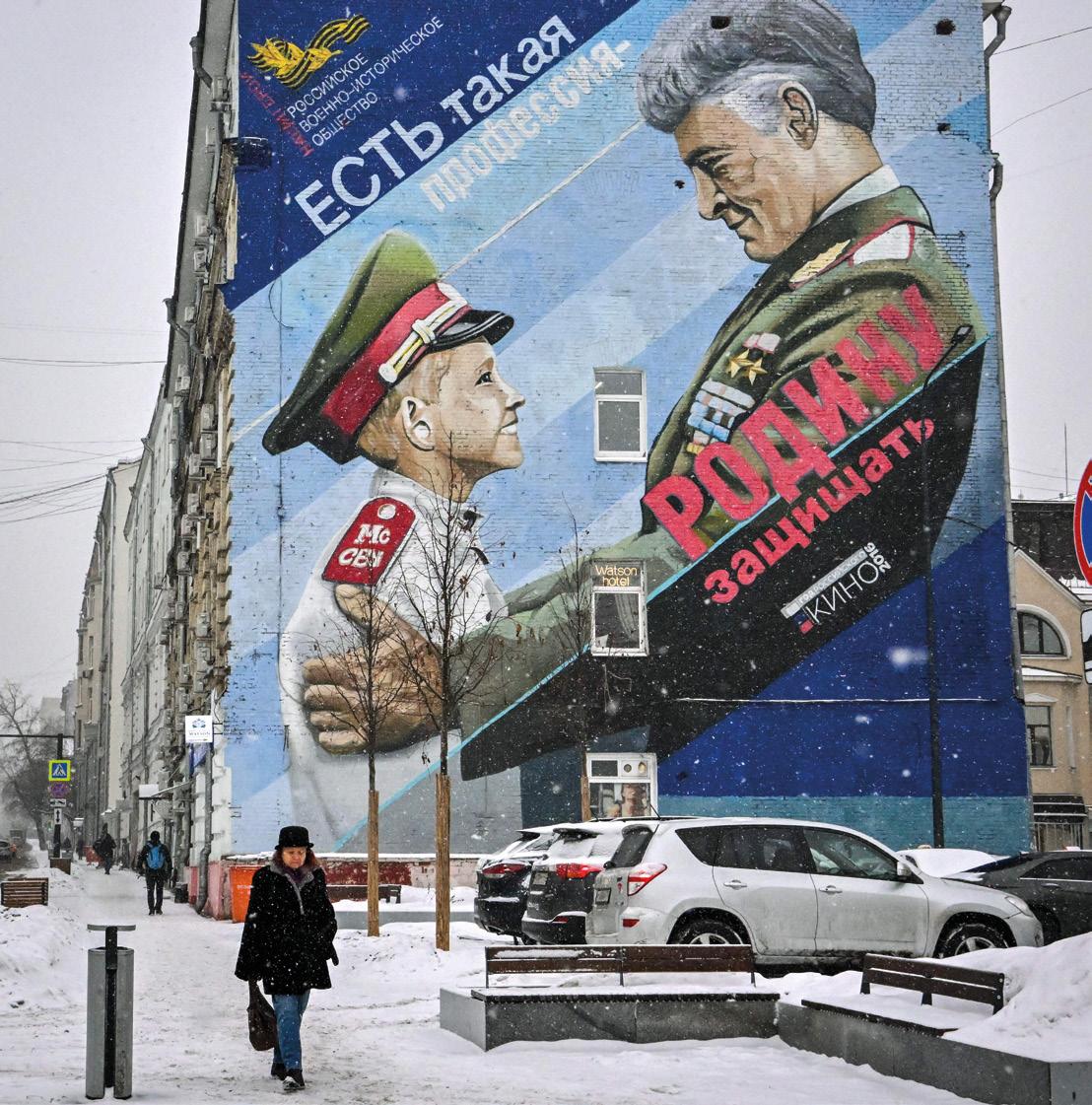
Things partly changed after the unexpected military draft which led to a sharp spike in anxiety among Russians. Many Russian women spared no money, often borrowing money to better equip their mobilised loved ones. State media is making some efforts to alleviate those fears, insisting that those mobilised will not be rushed to the frontline.

Unlike his Ukrainian counterpart, President Putin never visited the war zone in the first year of the conflict, despite some officials attempting to present his visit to a military headquarters in southern Russia as such. For most of last year, Putin appeared to distance himself from the detail of military campaign, addressing the public only on major topics like the launch of the invasion and the mobilisation drive.
The success of Ukrainian resistance lies in its grassroots nature. In today's Ukraine, the war is not just a matter for the military – it is a collective effort. Virtually every aspect of life – from art to sports – has become a front, not to mention the so-called information front where many Ukrainians use social media to raise awareness of their fight against Russia.
There is a multitude of fundraising campaigns. Ordinary Ukrainians donate money to buy drones for the military, support refugees or even buy food for stray animals in the conflict zone.
Images of Zelensky’s interactions with frontline troops in the war zone and visits to hospitals with wounded troops feature on the presidential website for all Ukrainians to see. He was in Bakhmut, a recent epicentre of fierce fighting, in December and has recently visited liberated places, most notably Kherson. The website also features his nightly video addresses to Ukrainians, updating them on developments and keeping them motivated.
5 MONITORING.BBC.CO.UK Monitor ISSUE 29
Unlike Zelensky, Putin never visited the war zone in the first year of the conflict
What shocked Ukrainians was how many Russians would rather believe their state media than their own relatives and friends in Ukraine
A Ukrainian soldier stands guard as civilians place sandbags to protect Odessa’s opera and ballet theatre
A mural in Moscow says: “There is such a profession – to defend the homeland”
SCOTT PETERSON/GETTY IMAGES
YURI KADOBNOV/AFP VIA GETTY IMAGES
Yana
Yana


Unity at home
Yaroslava
Russia’s political elites are
The war in Ukraine made Russia’s political elites even more united, with all parliamentary parties – already staunchly pro-Kremlin – rallying around Putin and passing increasingly conservative and anti-Western laws.
It even raised the prominence of warlords who were previously considered marginal. The Chechen leader, Ramzan Kadyrov and the Wagner private military company boss, Yevgeny Prigozhin, are now among the few figures daring to criticise the Russian military command.

As for the opposition, it has almost been eradicated inside the country. One of the last prominent politicians, Ilya Yashin, was jailed for “discrediting” the army and others are operating from exile.
Ukrainians quickly brushed aside political differences as Russia invaded

Ukrainians have longstanding political differences and are known to struggle with unity during peacetime. However, crisis situations tend to bring them together, and old grievances were quickly brushed aside as Russia invaded.
The long-standing consensus has been that the current state of unity should continue as any internal squabbling will only play into Russia's hands. More recently, however, the consensus seems to be faltering as corruption scandals rock Ukraine. But while the authorities are facing much more criticism now than they were in the early stages of the invasion, the country's general course of action in the war is almost never publicly challenged.
Zelensky signed a decree declaring 16 February Unity Day in 2022. It was the date that Russia’s potential invasion was expected to begin.
Monitor ISSUE 29 6 MONITORING.BBC.CO.UK
even more united
Former Ukraine President Petro Poroshenko, who faced "high treason" charges at the start of the invasion, backs the government’s approach to the war
Chechen warlord Ramzan Kadyrov is one of the biggest supporters of the Russian invasion, and has sent thousands of men to the front
MIKHAIL SVETLOV/GETTY IMAGES
MAXYM MARUSENKO/NURPHOTO VIA GETTY IMAGES
Yana


International allies
At the start of the war, Ukrainians pinned high hopes on the Western response to Russia's aggression. There were calls for sanctions, military aid and even a no-fly zone over Ukraine, which would effectively see Nato shooting down Russian aircraft. Ukrainians are reluctant to present themselves as victims and they tend to demand, rather than ask, to be supported.
But there were also worries that the response would not go beyond expressions of "deep concern" and symbolic sanctions, such as those that failed to deter Russia after the annexation of Crimea in 2014. So the extent of Western support – including arms supplies that enabled Kyiv to stage successful counteroffensives – turned out to be somewhat unexpected, although there is always appetite for more, such as aircraft or long-range missiles that would make it possible for Ukraine to strike Russian territory.

Russia’s stalled war effort and subsequent nuclear threats made the country’s official allies take an increasingly wary attitude towards bilateral cooperation. China and India, for instance, benefit from cheap Russian export goods but are in no hurry to provide desperately needed equipment.
Those who dared to come to Russia’s rescue are other heavily sanctioned states. Iran and North Korea, for instance, are believed to be providing Russia with weapons, among other things, and Belarus has been used by Russia as a training ground and springboard for the invasion.
With Belarus being a rare exception, Russia appears to be losing its influence even among former Soviet states, whose leaders are becoming less sycophantic and are openly confronting Putin. The Tajik leader has openly told him that his country wants to be “respected”.
President Zelensky's addresses to foreign parliaments –always perfectly tailored to the audience – have helped to mobilise public opinion internationally, at least in the West, and foreign media reporting helped shape the narrative of Ukrainians as brave fighters for freedom and democracy. Remarkably for someone in need of help, Zelensky not only appeals for help, he even criticises countries that are seen not to be doing enough, such as Hungary.
7 Monitor ISSUE 29
Former Soviet states are becoming less sycophantic; some have openly confronted Putin
Ukrainians are reluctant to present themselves as victims; they tend to demand, rather than ask for support
Yaroslava
PIERRE CROM/GETTY IMAGES
Western support enabled Kyiv to stage successful counteroffensives
Yana
The information war


Yaroslava
Russia is making overtures to the global south

Clearly losing the information war in the West, Russia has increasingly been befriending the global south. It has been amplifying its “decolonisation” narrative in its official rhetoric and increasingly blaming the West for the food security crisis. In one of the latest moves, Russia’s main foreign propaganda asset RT has decided to open a media centre in South Africa. Also, Russian Foreign Minister Sergei Lavrov undertook a tour of Africa which apparently aimed to portray Russia as a partner for the continent’s development and security.
Russia rejects the notion that it is responsible for the global food crisis. It says the situation has been provoked by the West and its sanctions on Russia.
for Ukraine
While Ukraine has effectively won the information war in the West, getting support from other parts of the world turned out to be harder. Take Israel, for example. From the start, it refused to supply weapons to Ukraine, citing its own peculiar geopolitical position. Even Iran's supply of kamikaze drones to Russia – which it has widely used against Ukraine – did not change this stance. Iran itself is now described in Ukraine as part of a new "axis of evil", alongside Russia and Belarus.
Ukraine’s narrative on global food shortages depicts Russia as the “cause of global famine” and Ukraine as the “guarantor” of food security.
8 Monitor ISSUE 29 MONITORING.BBC.CO.UK
Beyond the West, support from elsewhere has turned out to be harder
PHILL MAGAKOE/AFP VIA GETTY IMAGES
Russia increasingly portrays itself as Africa’s partner in its development and security needs
Media adjustments

Yaroslava
The one clearly measurable success Putin can boast of is the almost complete clean-up of independent media. Targeting this section of the media was well underway before the invasion, with draconian laws on “foreign agent” media – but it accelerated soon after.
Websites are being blocked for presenting the Ukrainian account of events or describing the hostilities as “war”, while Russia insists on calling it the “special military operation”. This was the case with the Siberian publication Tayga.Info, which reportedly received a letter from the Russian media censor asking it to remove the word “war” from a story.
The only platform that still carries independent Russian media outlets is Telegram, whose audience in Russia has doubled since the start of the invasion, reaching 40m people in June. The remaining unblocked media are either pro-Kremlin to varying degrees or do their best to avoid any war-linked reports.

Ukraine's media responded to the invasion with unity and defiance. The best example is the United News TV marathon – the pooled TV news service launched by leading channels in the early days of the war. The telethon unites broadcasters speaking in one voice, with strong emotive language, and promoting patriotic – and generally pro-government – narratives.


The effective monopoly that the authorities now have over Ukraine's once pluralistic broadcast environment has raised some questions: What will it look like after the war is over? Will the government be ready to relinquish the control it has gained due to the security situation?
Beyond TV, Ukraine can still boast media outlets that maintain editorial independence and raise topics that are awkward for the government. For example, there are popular websites that publish high-profile corruption investigations, including the one by the influential publication ZN.ua which shocked the public by suggesting that the Defence Ministry was procuring food for the troops at inflated prices.
9 MONITORING.BBC.CO.UK
ISSUE
Dissent in Russia has occasionally leaked through onto television
The only platform that still carries independent Russian media outlets is Telegram, whose audience in Russia has doubled since the invasion began
The monopoly the authorities have over Ukraine's once pluralistic broadcast environment is causing concern
Yana
Yaroslava Kiryukhina is an editorial lead in our Russia team. Yana Lyushnevskaya is a senior journalist in our Ukraine team.
CHANNEL ONE / BBC MONITORING BBC
Ukraine launched a pooled TV news service, broadcast on several channels
MONITORING
Somalia raises stakes on media in anti-terror campaign
In a drive to counter the ideologies and radicalisation methods used by jihadists in Somalia, the country’s president announced in August 2022 that all necessary means would be used to counter the al-Qaeda-affiliated al-Shabab group, including targeting its propaganda outlets, Somalia specialist Abdi Dahir writes.

President Hassan Sheikh Mohamud took power in May 2022 after a protracted electoral process. It was characterised by intense political rivalries that were exploited by jihadists to sow discord amongst politicians and the armed forces and to terrorise the public.
Mohamud previously served as president from 2012-2017. He returns with promises of peace and a fierce campaign against al-Shabab, which now controls much of southern Somalia and has a presence across the East Africa region.
In December, Mohamud told African leaders in Washington that his administration was raising public awareness of the dangers of al-Shabab’s ideologies, and mobilising communities to counter the group’s narratives and radicalisation methods.
Not only is the media being aggressively harnessed for counternarratives against jihadism, there is also a fierce crackdown on proShabab media, which the Information Ministry says is part of "an all-out war" against the group.
For journalists, the “all-out-war” can be a double-edged sword. The government’s recent ban on covering the group’s activities has raised concern about press freedom in a country that has traditionally ranked poorly on global media freedom indices.
At the same time, journalists face threats from al-Shabab for upholding the ban.

Monitor ISSUE 29
The new measures are a double-edged sword for Somali journalists
MOHAMED DAHIR/AFP VIA GETTY IMAGES
MONITORING.BBC.CO.UK 10
Journalists struggle to preserve press freedom while also trying to stay safe
New TV channel launched
On 23 November 2022, the government launched a new TV channel called Somali National TV Daljir (SNTV Daljir ) to combat militant propaganda
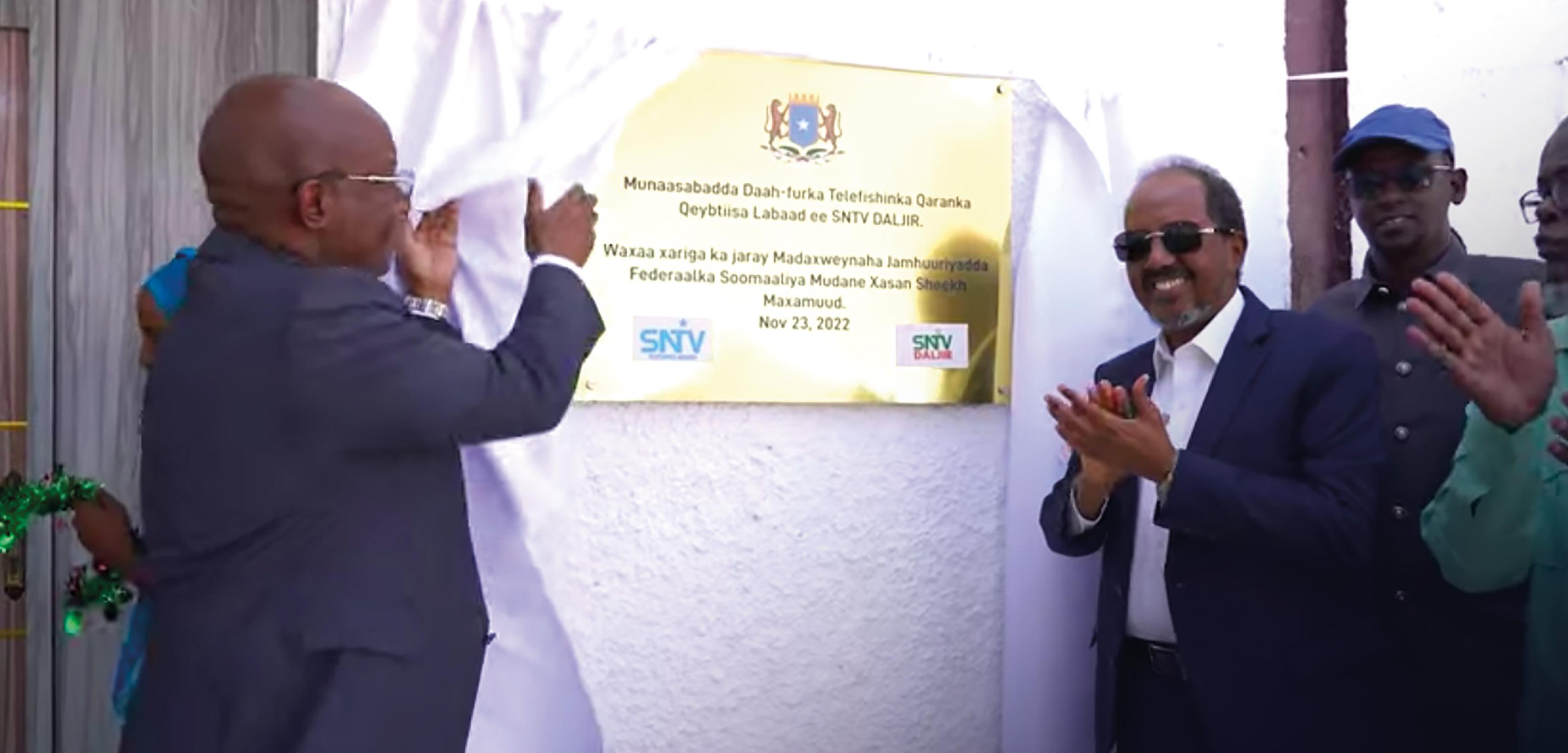
The state-run channel said it was part of a “direct war against the group’s propaganda and misinterpretation of the sharia”. It added that its programming would focus on military activities, including operations against al-Shabab.
Suspension of social media accounts

Shortly before the new TV channel was launched on 7 November, the government suspended over 500 social media accounts sympathetic to al-Shabab and banned news websites affiliated with the group. The suspension of social media accounts followed an 8 October government order to Somali telecom firms to block al-Shabab-affiliated websites.
Journalists’ unions say the ban is a threat to media freedom
Ban on al-Shabab media coverage
Independent Somali media outlets and journalists have been instructed not to publish news about al-Shabab or cover its activities. The authorities argue that disseminating "extremist ideological messages" will "endanger national security" but journalists’ unions say the ban is a threat to media freedom.
The Federation of Somali Journalists (Fesoj) and the Somali Journalists Syndicate (SJS) described the request as ill-thought-out and warned that it could “unduly restrict otherwise legitimate expression and press freedom in the country”, but the Somali government has remained firm.
On 11 October, SJS’s secretary general, Abdalle Ahmed Mumin was arrested. According to the Information Ministry, Mumin, who had openly criticised the ban on local reporting on al-Shabab, was detained “on security-related charges”. He was freed on 13 February but re-arrested on 23 February in a hotel in Mogadishu.
Hundreds of pro-Shabab social media accounts have been suspended
The new directive echoes a 2015 government order – again under President Sheikh Mohamud – for journalists to refer to al-Shabab as "Ugus" – an acronym in Somali for "the group that massacres the Somali people''. Private media outlets, however, ignored the order and continued to report on al-Shabab activities despite the threat of closure and other penalties.
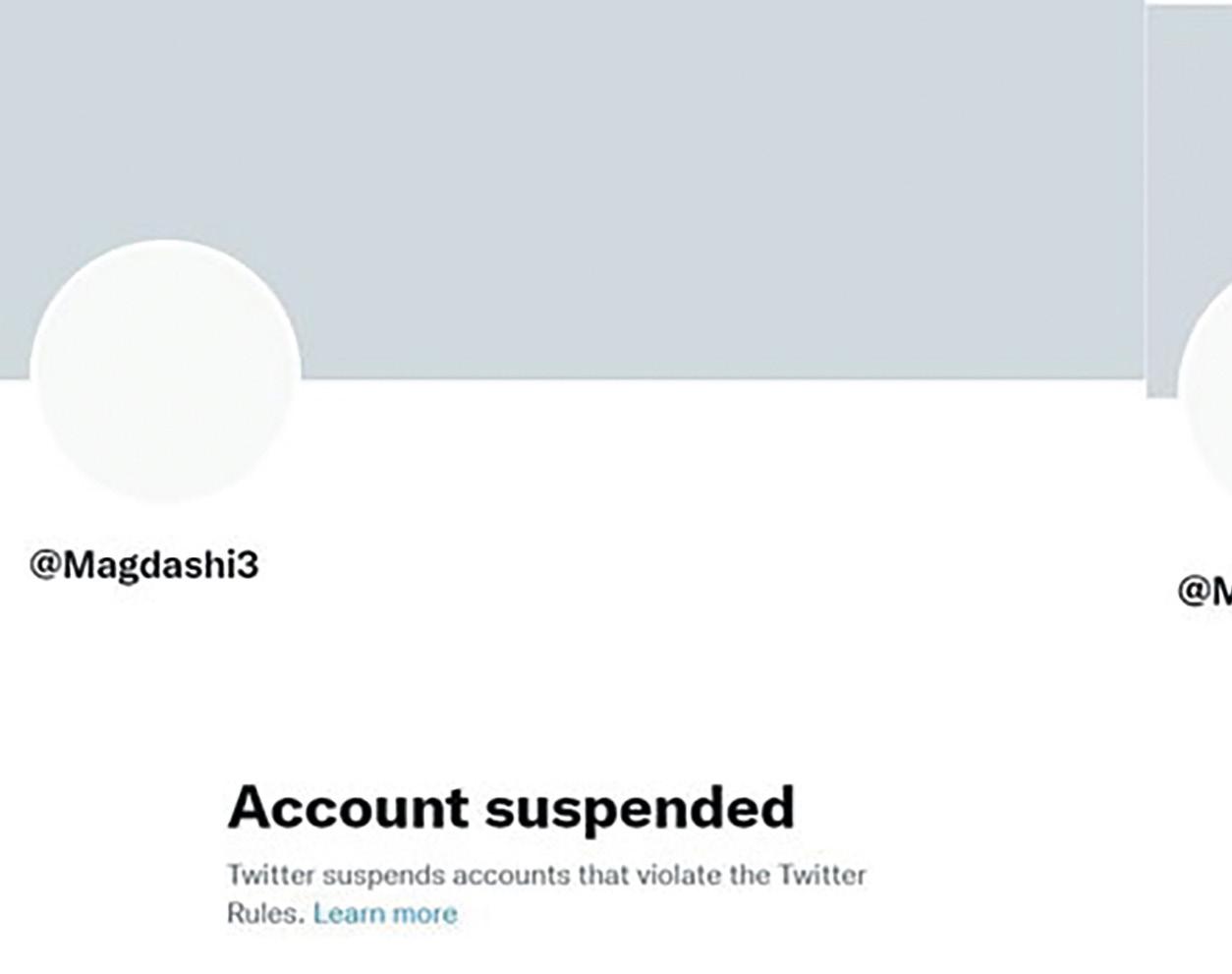
11 SNTV DALJIR
TWITTER
President Mohamud (right) at the launch of the SNTV Daljir station whose remit is to counter militant propaganda
Monitor ISSUE 29 MONITORING.BBC.CO.UK
Al-Shabab’s reaction
Al-Shabab has ordered journalists to flout the ban on using their propaganda content and warned internet providers not to block its affiliated media outlets.

Al-Shabab operates a sophisticated media machinery to disseminate its propaganda and radicalisation messages. It uses various multimedia formats including a mix of audio, text and video materials, which are then distributed through affiliated websites and social media platforms.
Its media wing, Al-Kataib Foundation, regularly produces slick videos, audio and images to accompany claims of attacks. It promotes so-called public outreach initiatives – including providing residents in al-Shabab strongholds with food aid, and sharing its ideology.
These messages seek to legitimise al-Shabab's activities and undermine attempts by the government to assert its authority.
As of late January, despite the government’s announcement, al-Shabab’s websites remain online and affiliate radio stations continue to broadcast, indicating that the authorities may not have the capacity to implement their directive. Meanwhile, the militants still control vast parts of central and southern Somalia.

12
Regional troops were deployed in Somalia to stem al-Shabab’s expansion
Al-Shabab spokesman Ali Dheere has threatened journalists who obey the government
Abdi Dahir is a BBC Monitoring Horn of Africa specialist with expertise on Somalia
MONITORING.BBC.CO.UK Monitor ISSUE 29 AL-KATAIB FOUNDATION GAEL GRILHOT/AFP VIA GETTY IMAGES
Inside Monitoring
You’ve seen the What, this is the How. Inside Monitoring is a blog written by our staff journalists, linguists and analysts from around the world. With access to local sources and a nuanced understanding of language and context, they truly live the stories and are able to identify what other news organisations may miss. In this edition, we talk about our new, improved formats for our content.
For a view from the other side, turn to Outside Monitoring on page 24.
MONITORING.BBC.CO.UK
ESSENTIAL MEDIA INSIGHT
Monitor ISSUE 29 13
Monitoring’s podcast debut
The idea to “audiofy” BBC Monitoring has been an ambition for a while. Bold, daunting even, but also too good not to pursue. Several years later, after tackling the ultimate creative challenge of the blank slate, we are about to launch our own podcast, Krassi Twigg writes.
The clue is in the title: The Global Jigsaw. We set out to create a podcast that helps the listener understand the world better: we look for stories off the beaten media track, find missing pieces of the puzzle and connect the dots – to get the bigger picture.
The BBC is the only media organisation in the world with a service like Monitoring and we are aiming to make the most of our distinctiveness to stand out in the crowded podcast space. Our linguistic capabilities enable us to lift the language barrier so we can, true to our motto, explore the world through the eyes of its media.



And it is the media landscape that interests us, particularly when it is weaponised – through propaganda or disinformation – to serve powerful agendas.
We do not just report on what is happening, but how what is happening is being reported and talked about.
In Season 1, we zoom in on several Russian influence operations around the world to understand what drives Moscow’s interest in faraway places. We look at how one jihadist group in Syria is trying to rebrand itself, modelling itself consciously on Afghanistan’s Taliban in a bid for political respectability. And we ask why some powerful people in China think the country has a “boy problem”.
You might hear some familiar voices, and will definitely hear new ones from our regional experts as well as World Service colleagues.
The Global Jigsaw will launch this spring on BBC Sounds and a variety of podcast apps. We have two experienced World Service radio producers on the team: Kriszta Satori from Newsday and Lucy Bailey from Newshour. Our video producer colleague Suniti Singh has started creating some brilliant visualised versions for the World Service YouTube page which we hope will pull more listeners in. And – further down the line – we will explore opportunities to create multilingual versions of the podcast, in collaboration with the World Service.

14 Monitor ISSUE 29
Video producer Suniti Singh working on the podcast
Krassi Twigg is the host of The Global Jigsaw podcast
BBC MONITORING
"We are aiming to make the most of our distinctiveness"
MONITORING.BBC.CO.UK
BBC MONITORING
War in Ukraine: The Global Impact
Since 24 February 2022, Russia’s invasion of Ukraine has been a key focus for BBCM. At a customer event on 6 December chaired by BBC Correspondent Paul Adams, eight BBC Monitoring experts delivered their take on the global effect of the Ukraine war.

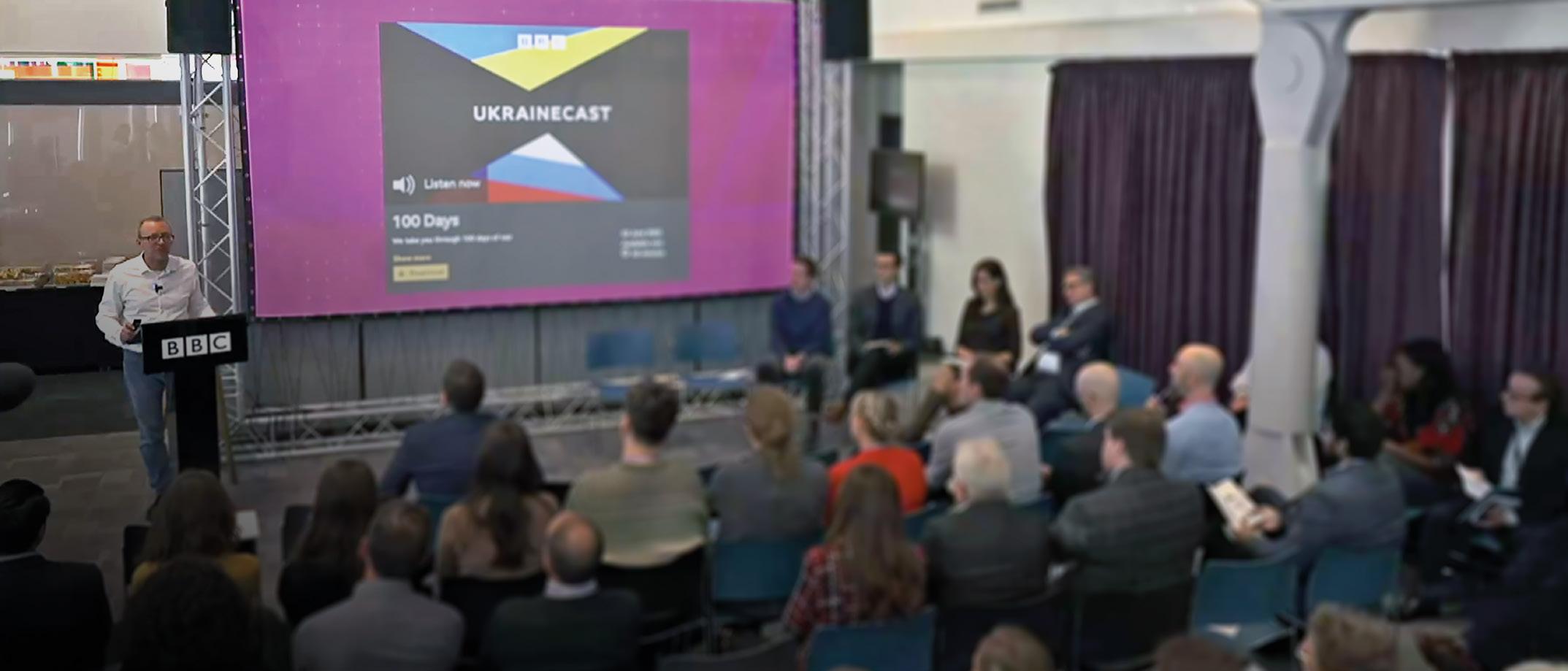
Russia editor Vitaliy Shevchenko, who has roots in eastern Ukraine, spoke of the challenges of reporting war at home. He also gave a moving tribute to all of his colleagues affected by the conflict.
Francis Scarr, a Russia specialist who has been tracking the narratives on Russian TV, spoke about what it is like to monitor Kremlin propaganda for a living. Russian channels have been broadcasting non-stop propaganda panel shows which seek to present war in Ukraine as a “Washington-led Western provocation”.
Disinformation specialist Olga Robinson spoke about how her team had approached the disinformation war that has been raging online since day one of the invasion. A native Russian speaker, Olga has spent the last decade observing and reporting on propaganda and disinformation in Russian media.
Much was made of China’s declaration that its friendship with Russia had “no limits”. But no major nation has so far rallied behind Russia, not even China, which just days before the invasion vowed an “unbreakable” bond with President Vladimir Putin.
China specialist Ankur Shah explained how Russia’s invasion of Ukraine challenged Beijing’s messaging at home.
Middle East expert Hicham Yezza spoke of the key themes shaping official and media reactions to the war in North Africa. He also reviewed Europe’s efforts to reduce its dependence on Russian gas, the impact on Russia’s political and military ties in the region, and the challenges facing Western narratives around the war.
Middle East specialist Amira Fathalla took the audience through reactions from the Gulf region and how these may herald shifts in geopolitical alignment.

Kia Atri, an Iran specialist, highlighted the impact of the war on Tehran’s relationship with Moscow. Tehran has made cautious attempts to show its political support for Moscow and is seeking to benefit from the resulting trade and security opportunities.
African analyst Beverly Ochieng said Moscow was taking advantage of Africa’s ambivalence over the war and increasing its footprint in Africa to undermine Western presence there. This is particularly the case in unstable states, many of which are reluctant to pick sides. Africa’s historic roots with the former USSR underpinned its position on the conflict. In the face of a global food crisis, African leaders are desperately seeking practical solutions.
The presentations were followed by a lively Q&A session, expertly chaired by Paul Adams.
MONITORING.BBC.CO.UK 15 Monitor ISSUE 29
Olga Robinson speaks about disinformation
Simona Kralova reports on our first in-person customer event since the pandemic.
Simona Kralova leads our Planning and Impact team and produced the 6 December event
BBC MONITORING
BBC MONITORING
Iran moves in as Russian influence declines in South Caucasus
As Russia's financial, economic and military resources dwindle due to its war in Ukraine, its leverage in the South Caucasus is also declining, Sevinj Mahdavi and Gayane Aleksanyan report
Russia’s focus elsewhere has encouraged Armenia, its traditional ally, to look for friends in the West, while Azerbaijan, Armenia’s foe, is disregarding Moscow's interests in the region.
At this point, Iran has moved in –perhaps in coordination with Russia – in a bid to prevent forces from outside the region from filling the emerging gap.
Tehran has on several occasions warned outside players not to make inroads into the South Caucasus.
It has pledged support to Armenia, held a large-scale military exercise on the border with Azerbaijan and Armenia, and intensified its anti-Azerbaijan rhetoric.
senses a golden opportunity
The other main regional player, Turkey, has strong positions in Georgia, and especially Azerbaijan, so Iran has a golden opportunity to bring Armenia into its orbit.
Tehran's recent attempts to influence Baku’s policies – in particular Azerbaijan's military cooperation with Israel – have increased longstanding tensions between the two countries.

Monitor ISSUE 29 16 MONITORING.BBC.CO.UK
FATEMEH BAHRAMI/ANADOLU AGENCY VIA GETTY IMAGES
Iran
Iran wants to prevent Turkey and other countries from making inroads into the South Caucasus
Iran, Russia acting in tandem
Some observers in Azerbaijan believe the "hasty" opening of an Iranian consulate in Kapan, in Armenia's southern Syunik Region, and the largescale Islamic Revolution Guards Corps (IRGC) exercise near the Azerbaijani border, were meant to put pressure on Baku ahead of the talks hosted by Russian President Vladimir Putin in Sochi on 31 October 2022.
At that Armenia-Azerbaijan-Russia meeting, Putin failed to convince Azerbaijani President Ilham Aliyev to sign a document that would give special status to the breakaway Karabakh region and extend the Russian peacekeeping mission there.

Aliyev confirmed concerns over Iran when calling on Yerevan on 8 November to expedite the signing of the peace treaty with Baku. He said Armenia should not be relying on Iran, which he said held military exercises "in support of Armenia".
Ukraine war limits Moscow's weapons supply to Yerevan
Azeri state TV said Tehran was crossing a “red line” for Azerbaijan by supporting Yerevan and preventing it from reaching a peace agreement with Baku.
When Armenian Prime Minister Nikol Pashinyan visited Tehran immediately after the Sochi meeting, some Armenian media sources commented that Russia and Iran were coordinating their efforts to prevent the involvement of third countries in the normalisation of relations between Armenia and Azerbaijan.
Monitor ISSUE 29
17
MONITORING.BBC.CO.UK BBC MONITORING
Iran fears the Zangazur corridor might strengthen Azerbaijan-Turkey ties and unite Turkic countries
Armenia's military policy shifts
Following its defeat in the 2020 Second Karabakh War, Armenia realised the ineffectiveness of its old Soviet-era military operations and equipment and took steps to shift to modern standards. The war in Ukraine and logistical problems have also significantly limited Moscow's ability to supply weapons to Yerevan.
Calls have also been growing in Armenia for quitting the Russia-led military alliance – the Collective Security Treaty Organisation (CSTO), which could lead to the US agreeing to sell arms to Armenia. In the meantime, Yerevan has signed contracts with Indian companies for the purchase of artillery gun systems, rocket launchers, anti-tank missiles and ammunition.
In May, Armenia signed military cooperation agreements with Greece and Cyprus.
It is also stepping up defence cooperation with France. In September, the leader of the pro-Russian opposition Hayastan (Armenia) bloc, Robert Kocharyan, suggested that Iran could substitute Russia’s role in ensuring Armenia's security.
The idea was echoed by Iranian Foreign Minister Hossein Amir-Abdollahian who said at the opening of the Iran consulate in Kapan in October that "we view the security of Armenia as the security of Iran".

Iran-Azerbaijan tensions
Amir-Abdollahian also said Tehran would make efforts to strengthen the north-south transport route that links the Persian Gulf to the Black Sea via Armenia and Georgia.
In the meantime, Iran has strongly opposed the opening of a transport link between mainland Azerbaijan and its Naxcivan exclave and further west to Turkey via Armenia – a stipulation of the 2020 armistice agreement signed between Baku and Yerevan with Moscow's mediation.
Tehran's recent aggressive rhetoric towards Azerbaijan appears to be driven by concern that this planned route (the Zangazur corridor) could strengthen the Azerbaijan-Turkey alliance and unite Turkic countries in the Caucasus and Central Asia.
In March 2022, Iran and Azerbaijan agreed to build a similar link between western Azerbaijan to Naxcivan via Iran. Tehran fears it could be sidelined and Turkey could have greater influence in the region if the borders between Azerbaijan, Armenia and Turkey were opened.
Monitor ISSUE 29 18 MONITORING.BBC.CO.UK
Azerbaijan feels Iran is ‘crossing a red line’
Iran opened a consulate in a small Armenian town on the Azerbaijan border
IRANIAN MINISTRY OF FOREIGN AFFAIRS/ANADOLU AGENCY VIA GETTY IMAGES
Iran's perspective
Iran considers the Zangazur corridor to be an expansion of Israel and Nato towards its borders. It fears this could block its connection with Armenia, and cause it to lose easy access to the region while having to deal with Azerbaijan, backed by Iran's enemy –Israel.
While Baku insists that friendship between Israel and Azerbaijan is not directed at any third party, Iran always feels threatened by any Israeli activity in the region.
Iran calls the Zangazur corridor "Nato's Turan corridor", designed by the US, the UK and Israel and intended to bring Nato troops onto Iran’s northern border with geopolitical consequences for Iran, Russia and China.
The corridor “will complete the plan to encircle these countries and lay the groundwork for their partition," the Strategic Council on Foreign Relations, an advisory body to the Iranian Supreme Leader, said in September.
Another concern regarding the corridor on the border with Iran is that it could help Ankara and Baku foment ethnic unrest in the northern areas of Iran where ethnic Azeris live. This could result in Baku laying territorial claims on Iran.
Iran-Azerbaijan war unlikely
Azerbaijan's president, MPs and state media have spoken extensively about the rights of ethnic Azeris in Iran and even revived the old discourse about the unification of the Azerbaijani Republic with Iranian Azerbaijan.
Azerbaijani media have discussed the possibility of Iran unleashing a war against Azerbaijan. This is however unlikely for several reasons: Azerbaijan's military alliance with Turkey and Pakistan, Azerbaijan's strong army, its energy partnership with the West, and Iran's large ethnic Azeri population, which is significantly larger than the entire population of Azerbaijan.
Some commentators believe that Israel, which supported Azerbaijan militarily in the 2020 Karabakh war, could join an anti-Iran coalition in case of war.
Gayane Aleksanyan and Sevinj Mahdavi work for our Tbilisi office, specialising in Iran and the South Caucasus region

19 MONITORING.BBC.CO.UK Monitor ISSUE 29
STRINGER/AFP VIA GETTY IMAGES
The Azerbaijani flag flying on the border with Iran
Tunisian media feel strain of shift to authoritarianism
Media professionals, unions and watchdogs are warning of a serious deterioration in media freedoms in Tunisia as the country drifts into authoritarian rule, Samia Hosny writes.

President’s view of the media
President Kais Saied has consolidated his power through a series of measures since July 2021 and the adoption of a controversial new constitution almost a year later, moving more decisionmaking to the presidency.
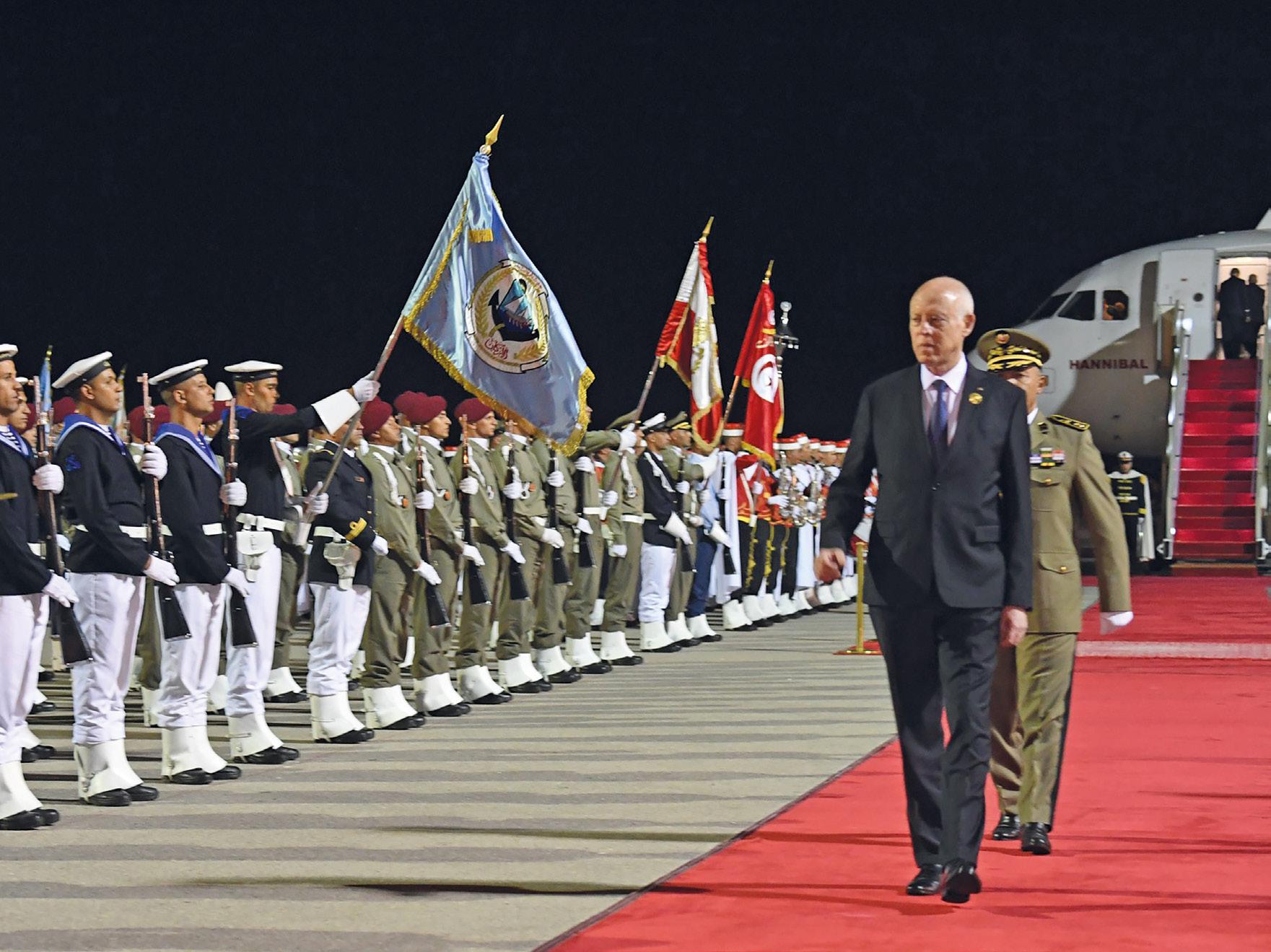
The shift has been criticised by President Saied’s opponents as a reversal in Tunisia's path to parliamentary democracy.
Journalists have not been spared in Saied’s regular tirades against various groups in the country. Following a verbal attack on judges last year, Saied criticised the media’s news coverage.
In May 2022, the president accused the media of “falsifying facts” and reporting “trivia rather than important issues".
He was quoted as saying that freedom of expression “must be preceded by freedom of thinking” and that "patriotic thought is that which seeks to preserve the state and its institutions".
Tunisia's president has embarked on a series of measures expanding his powers since 2021.
Oct 2019
Saied, a constitutional law professor, is elected president
Jul 2021
Suspends parliament, lifts MPs' immunity and sacks PM under new "exceptional" measures after popular unrest
Sep 2021
Issues a decree giving himself expanded powers over key institutions
Feb-Apr 2022
Dissolves Supreme Judicial Council, formally disbands parliament, restructures election commission
Jul 2022
New constitution extending presidential powers approved in referendum
Dec 2022
Parliamentary elections are boycotted by Tunisia's main parties and marked by a record low turnout of 11.2%
Jan 2023
Election re-run has similarly low turnout of 11.4%, a stark indictment of his popularity
Monitor ISSUE 29
20
FACEBOOK/TUNISIAN PRESIDENCY
A new constitution extends the president’s powers
MONITORING.BBC.CO.UK
The president has moved to consolidate his grip on power
WWW.FACEBOOK.COM
Media workers face harassment
As Saied gathers power in his own hands, domestic media across the political spectrum have reported various forms of harassment and attack.
Noureddine Boutar, the director of the popular Radio Mosaïque FM, was arrested in a wave of arrests of high profile individuals and politicians in February 2023.
The station has long been critical of President Saied. International media watchdogs have strongly denounced the move, with Article 19 pointing out that the journalist was arrested “in the absence of any clear charges against him”.
In November, the strongly anti-Saied Business News website said its founder and manager, Nizar Bahloul, and journalist Raouf Ben Hedi had been questioned by the police after the justice minister filed a complaint over a critical article published in the outlet that examined the prime minister's first 13 months in office.
In January 2022, Walid Manser – the head of the union of technical and administrative workers at the national television channel – reported the storming of the TV building by “special forces”. They threatened to punish workers if they went ahead with their plan to stage a strike, Manser said.
In October 2021, the pro-Islamist Zitouna TV reported that the security forces had stormed its studios and that its presenter Amer Ayed had been arrested and questioned before a military court after reading an antidictatorship poem on air.
There have also been reports of police harassing journalists covering antiSaied protests.
The National Union of Tunisian Journalists (SNJT) has condemned "extreme violence" used against journalists.

MONITORING.BBC.CO.UK
21 Monitor ISSUE 29
YASSINE
VIA
Journalists have sounded the alarm
MAHJOUB/NURPHOTO
GETTY IMAGES
A new decree carries unprecedented restrictions on reporting security and political news
A reversal in Tunisia's path to parliamentary democracy
Media’s independence under threat
Journalists have sounded the alarm over what they see as state restrictions taking many forms.
In April 2022, public media workers staged a nationwide strike to protest at perceived government attempts to control the editorial line of their outlets. The SNJT had warned at the time that Tunisian state TV had been transformed into a "platform" for voicing the president's political orientation.

The SNJT's deputy head, Amira Mohamed, says most threats to journalists came first from the government. She also noted the judiciary as a source of attacks on media professionals for "the first time".
The union attributes the “dangerous slide” in Tunisia's ranking in Reporters Without Borders' 2022 World Press Freedom Index to a rise in action against journalists. It cites prosecutions, arrests, trials before military tribunals, and the authorities blocking access to information.
Decree 54 and freedom of expression
In September, President Saied issued a decree-law against spreading false information and rumours online.
The SNJT and human rights groups said Decree 54 imposed "unprecedented restrictions that will lead to the intimidation of journalists and citizens from expressing their views, especially on matters related to security personnel and political officials".
The crimes mentioned in the decree include "deliberately using information and communication networks and systems to fabricate, disseminate, publish, send or produce false news, statements or rumours or documents that are fabricated, falsified or wrongly associated with a certain party with the purpose of infringing upon other people’s rights or undermining national security or defence”.
Such actions are now punishable by prison sentences of five years and fines worth up to 15,000 US dollars. The penalties are doubled if the defendant is a "public official or quasi-official", according to the decree.
Uncertain future for media regulator
Tunisia’s media regulator – the High Independent Audiovisual Authority, (HAICA) – has been fighting for its existence over the past year. Its role is no longer enshrined in the new constitution and its future is uncertain.
The regulator was established as a provisional constitutional authority under the now defunct 2014 constitution. This provision was removed from the new constitution, HAICA member Skina Abdessamad said.
22
ISSUE 29
MONITORING.BBC.CO.UK
Samia Hosny is a BBC Monitoring Middle East and North Africa specialist with expertise on Tunisia
VIA
FETHI BELAID/AFP
GETTY IMAGES
Activists warn of a reversal of the freedoms gained from the uprising that launched the ‘Arab Spring’

OUTSIDE MONITORING
BBC High Risk team
Tim Coey, an analyst in the BBC’s High Risk team, explains what his team does – and how BBC Monitoring reports help assess the security situation in the countries where the BBC deploys staff.

Reporting from conflict zones is a highly dangerous and difficult job. The BBC has special arrangements to manage work where there may be a significantly higher than normal risk of death or serious injury to staff resulting from:
• going to or being resident in an environment designated as hostile by the BBC;
• taking part in activities deemed High Risk by the BBC;
• deploying to High Risk Events.
The High Risk and News Safety team where I work supports teams with advice as they prepare for their assignments and with support after they are deployed. My role as an analyst is to make sure that relevant information is available to staff as they do their risk assessments, to keep the country risk designations up-to-date (Red/Hostile Environment; Yellow/ Travel Advisory), and to update that information if anything changes. That information feeds through into the Risk Assessment templates for locations.

Monitor ISSUE 29 24
MONITORING.BBC.CO.UK
BBCM Alerts help me ensure that the latest risk news updates for a location are accurate and complete
BBC
High Risk’s Rich Stacey on deployment in Iraq with a BBC News team
As an analyst in the High Risk team I find the BBCM website an invaluable tool and source of expertise. The searchable database going back to the 1990s gives me quick access to information on topics relevant to our main risk assessment categories: conflict/war, terrorism, civil unrest, health risks, economic and environmental factors, transportation, crime statistics, the media environment, information security risks, and kidnappings and detentions.

BBCM Alerts help me ensure that the latest risk news updates for a location are accurate and complete.

In addition, BBC Monitoring’s Media Guides and Country Profiles – the latter are available on the public BBC News website – often provide necessary background to teams planning deployments, to risk assessors, and to the risk owners/managers who approve deployments. The Insight pieces give context and help identify new trends which affect the risk profiles of many more hazardous locations.
BBC Monitoring offers important quotes “from the horse’s mouth” as well as access to a variety of in-house expertise and knowledge. This includes diverse perspectives based on experience of life and work in many different media environments. BBC Monitoring’s expertise is a great help when we are making assessments of the security situation in the locations where we send journalists to report for BBC News.
25 Monitor ISSUE 29
Tim Coey is an analyst in the BBC’s High Risk team
BBC Monitoring’s expertise is a great help when we are making assessments
Deployment planning: looking at the security situation in Algeria MONITORING.BBC.CO.UK
BBC
Living the story: Gennadiy Kot

BBC Monitoring’s output may give the impression that it is business as usual in our Kyiv office, with dozens of news products on Ukraine and its neighbouring countries delivered to our audiences every day. But what has life really been like for the team? Editorial lead Gennadiy Kot writes.
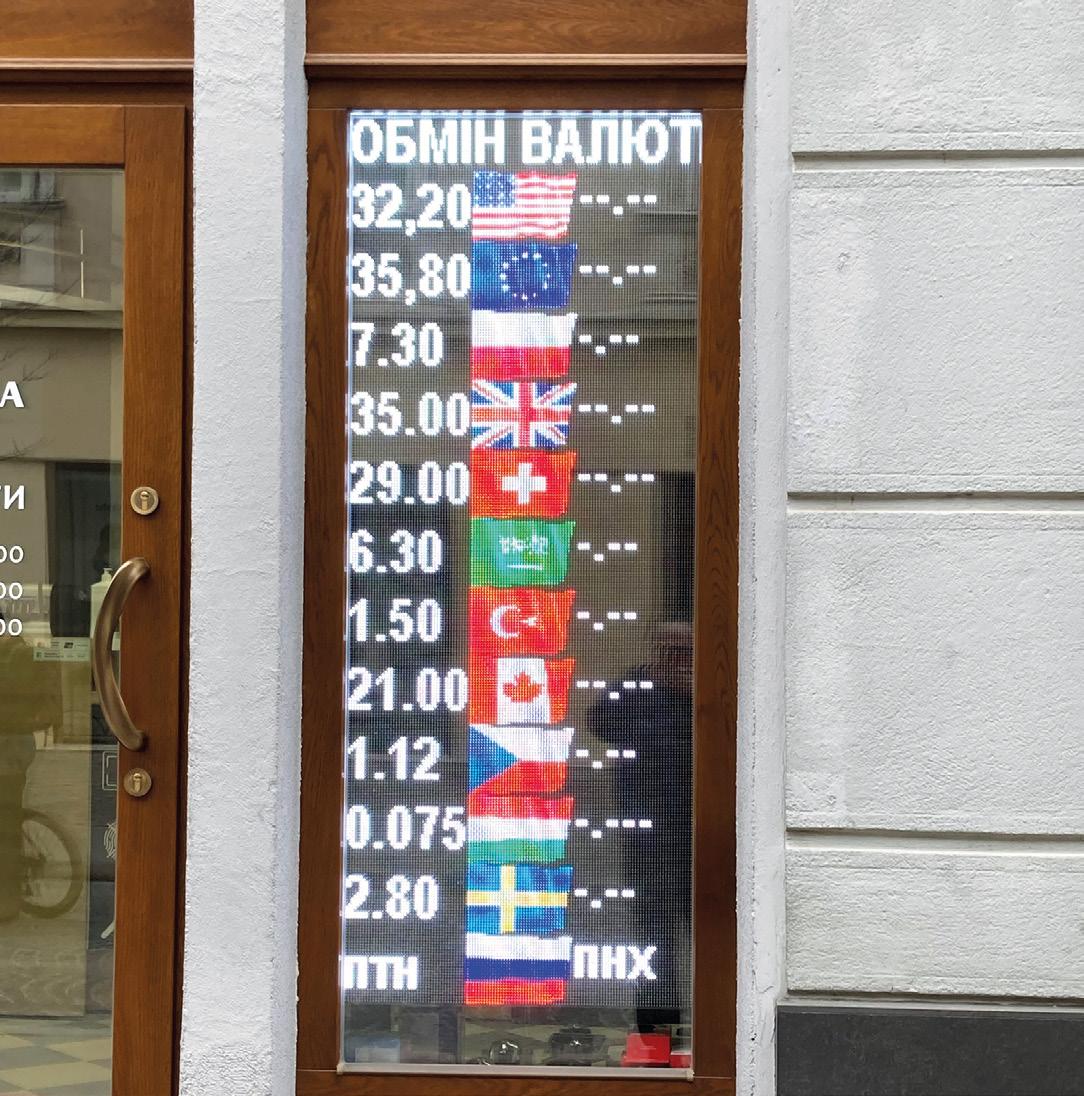
Driving west
When I woke to the sound of distant explosions in Kyiv on the morning of 24 February last year, I realised life would never be the same again.

As a fledgling monitor in the late 1990s, I worried about translation, selection and the occasional failure to record a news bulletin on tape. Now, as a manager, I make sure the team operates smoothly and provides comprehensive coverage – but only after every team member is “accounted for” and is as safe as you can be in a country under attack.
When Russian tanks were closing in on Kyiv in February and March last year, the team had to be moved out of the city. The Russian atrocities in Bucha or Irpin had not yet come to light, but we knew nothing good would come from a Russian occupation.
Frequent air sirens, explosions, rattling windowpanes and shaking doors made me decide to move my family. As we drove west for two days through endless roadblocks and traffic jams, we were unaware that if we had taken the main highway, we could have been shot at by Russian troops, who were targeting – and killing – civilians in their cars.
We have now learned to live with air raid sirens going off across the country, sometimes several times a day. We know where the nearest bomb shelter is – and the difference between the sounds of a missile hitting a target and of a missile being shot down by air defence. We have become experts on the inaccurate but lethal scrap metal used by Russia to bomb our cities and energy infrastructure.
26 Monitor
29 GENNADIY KOT. GENNADIY KOT.
ISSUE
MONITORING.BBC.CO.UK
Smoke rises over Lviv after a missile strike in January 2023
Foreign Exchange bureau in Lviv replacing the rate for the Russian Rouble with “PTN PNKh” (Putin go to hell)
Power outages
Thanks to the Kremlin, I’m now sure that in the past, we were taking electricity and the internet for granted. There is not much you can file during a power outage. Unless you prepare, of course.


When electricity goes, you can use an advanced power bank for your laptop and hope the mobile internet works on your phone. More often than not, you have to move to a different location with a generator and internet access to continue working. When there is no power, you also lose heating and hot water in many places.
A blessing in disguise
While work has been a challenge, it has also been a relief. Running a dispersed team is tough, but remote working during the Covid-19 pandemic has proven to be a very useful exercise.
Our team has come really to appreciate the rare opportunities we get to meet in person – most of the team to be more exact – offered by training courses and other events. And overall, bringing useful information and insight to our users has been a blessing in disguise amid the stressful uncertainty of the war.
Gennadiy Kot is the editorial lead in our Kyiv office
GENNADIY KOT.
GENNADIY
KOT.
MONITORING.BBC.CO.UK Monitor ISSUE 29 27
We could have been shot at by Russian troops
Poster reads: “Ukraine is a country not a province!”
Traffic sign reads: “Putin has lost, the world is with Ukraine”
TO DISCUSS HOW WE CAN HELP YOUR ORGANISATION CONTACT US AT:

MONITORING@BBC.CO.UK
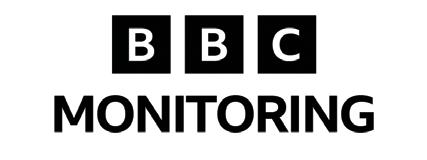
MONITORING.BBC.CO.UK
twitter.com/BBCMonitoring linkedin.com/company/bbcmonitoring
BBC Monitoring observes, understands and explains media throughout the world, providing deep insight and enabling organisations to make better, more informed decisions. Our teams monitor and analyse developments in areas including geopolitics, terrorism and other security-related issues for BBC News as well as our clients, who include governments, NGOs and major corporations worldwide.
BBC © 2023 All rights reserved. No publication or distribution of the whole or any part of this magazine is permitted without the written consent of BBC Monitoring.
ROMAN PILIPEY/GETTY IMAGES































































